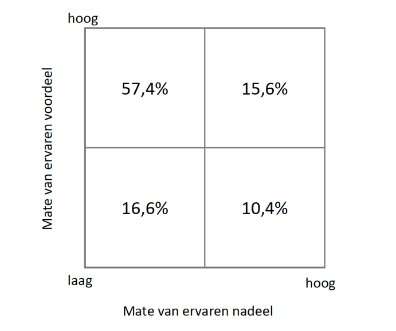Lockdown research shows working from home pays off

The lockdown in the corona crisis is unintentionally the biggest working from home experiment ever. Recent research carried out by Tilburg University in collaboration with Veldhoen + Company shows that working from home pays off. People say that it fits in better with their own social preferences, that they can work more efficiently and have more control over their working day. The survey was conducted among 5,000 respondents from all over Europe.
The lessons to be learned from this large-scale social experiment are valuable for a well-founded interpretation of "the new normal," with a large and structural role for working from home.
The respondents can roughly be divided into two groups. One group indicates that they work more hours and experience more pressure, while the other group indicates that they work the same amount of hours or less, and experience less work pressure.
Advantages outweigh disadvantages
The survey shows that the advantages people experience by working from home clearly outweigh the disadvantages. The figure shows that 57.4% of the respondents experience benefits. The biggest advantage: a better connection to one's own social preferences (atmosphere, contact with others).
In addition, working from home is seen as more efficient and employees are happy with the control they have over their working day.
The biggest drawback: long-term virtual working. Some of the respondents indicated that they found the work to be less meaningful and did not have enough resources at home to do their work well.
Conclusions and recommendations
- All respondents experience the current situation differently. There is no such thing as a universal approach to working from home. It should be situational and accommodate individual needs.
- The advantages strongly outweigh the disadvantages. Moreover, the benefits are both hard (productivity) and soft (well-being).
- Most of the disadvantages experienced by homeworkers can be solved. By looking specifically at the type of work, the appropriate workplace, and making the right tools available, the main drawbacks can be minimized. Virtualization probably requires the most attention in this respect.
These results pave the way to give working from home a structural place in the way we work. Marc van Veldhoven (Tilburg University): "It's important not only to work on this in scientific circles.This is not primarily a theoretical discussion, but a social one. Organizations are all faced with the question of what 'the new normal' should look like. With our input we can help organizations to substantiate this. We're showing that there are great opportunities right now to make work better."
The research of Tilburg University and Veldhoen + Company is part of a larger international study initiated by the Technical University of Denmark (DTU). The aim is to use this unique situation to gather new knowledge to support employees who work from home and to support managers to create the right conditions for this. Incidentally, the study also shows that the Netherlands is already ahead of other European countries.
More information: Veldhoven et al. (2020). Experiences of working from home in Corona's times: European questionnaire survey among 5,000 knowledge workers during the first weeks of the lockdown, DOI: 10.13140/RG.2.2.34262.27208
Provided by Tilburg University




















